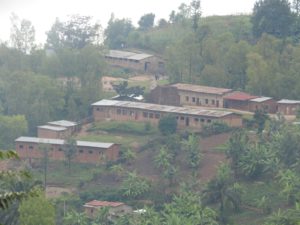Sexual misconduct resulting in unplanned parenthood alarmingly scourges the youth of the educational district of Kabezi.

Reports say students often meet in these classrooms of Lycée Gitenga for dates
Increasing numbers of undesired pregnancies are ruining the future of students in the education district of Kabezi as they interrupt their studies and force them into unwanted lives – a situation that school principals says is “alarming”.
Roger Migezo, the head of the education district of Kabezi, says at least 18 cases of pregnancies were registered in the district during the school year 2015-2016.
Becoming or making someone pregnant means suspension for students and, in most cases, being forced into living together without being married. In some other cases the students choose to run away if they can’t face the shame, the rejection by the family or are afraid of legal action. In rare cases they choose abortion.
On 27 March, the disciplinary council of Lycée Communal of Kabezi decided to suspend four students for sexual misconduct that led to undesired pregnancies.
“The following day a report came in that one of the four students had been rushed to hospital because she had had an abortion”, says Raymond, Headmaster of Lycée Communal of Kabezi. The incident has resulted in a criminal inquiry.
Students like Claudine Nzoyihaya who accepted the situation and gave birth say their lives become very difficult.
Nzoyihaya was in grade 8 at Communal Lycée Gitenga when she became pregnant with a man who had promised to marry her. She said she was 18 when it happened. When the man discovered he had made her pregnant, he ran away, leaving her to face the consequences alone.
Now she says it’s extremely hard for her to live as a single mother given that her parents are not always supportive. She worries about her future and the future of the child who is registered with no father. Nzoyihaya would go to a vocational school if she had an opportunity. “In that way, I would be able to meet my needs”, she says.
Emelyne Niyonzima, 20, illegally lives with her boyfriend who got her pregnant when both were in secondary school at Lycée Gitenga. She says they live in hardship, earning their living by working for people who pay them BIF 1500 (approx. 0.9 US $). per day
Some of the students who are forced into living together unlawfully often divorce in the long run. Bernard Bushambara, a volunteer who supervises students at Lycée Gitenga, says some girls are called back home by parents who pity them for the miserable lives they live. Others return home when their husbands leave them home alone, and are unable to endure the terrible living conditions.
What are the causes?
Some, like Niyonzima, say they engage in unlawful sexual activities (in Burundi, sex is virtually illegal outside marriage) due to poverty. For others it is because of peer-pressure. A young man, who was suspended from Lycée Communal de Kabezi because he made his 8th grade girlfriend pregnant, says there is pressure on students to have sexual relations. “You feel bad about yourself if you don’t have a girlfriend. And having sex is not always something you plan”, he says.
Mr Migezo, the Head of Kabezi education district, dismisses the claim that poverty is the cause of illicit sexual relationships. “We all grew up here in dire poverty, but we didn’t get involved in criminal activities to finance our studies”, he says. He says that among the underlying causes include the fact that nowadays students see school as irrelevant and seem to have no vision for their lives. Some girls are not willing but forced to be at school. And if any man promises to marry them they follow him. “That’s why the majority are made pregnant by people who are not even students”, he concludes.
Migezo says another important cause is the access to pornographic images. Epaphrodite Nkengurutse, a local Pastor corroborates the claim and says he has testimonies from students who have been involved in illicit sexual activities. “The videos they access, thanks to their phones, worsen their lust”, he says.
Migezo says that despite the disheartening misconduct of students, school principals and teachers steadily continue advising their students against anything that can lead them into sexual misconduct.
He hopes the Association for the Promotion of Auto-Education (ASSOPRA), a new association that has just started operating in the district, will help curb sexuality-related problems as it aims to teach the community to adopt “behaviour and attitudes likely to bring about a good future for students and the community in general”, says Guide Karorero the President of the association.
Dr Vianney Ndayishimiye, a member of the association, says that as a medical doctor he tries to help students understand the negative consequences that can follow illicit sexuality and how they can avoid them.

















 IWACU Open Data
IWACU Open Data

